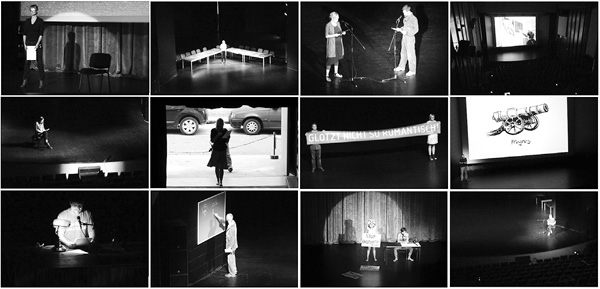
OKTOBAR XXX: EXPOSITION-SYMPOSIUM-PERFORMANCE
first performed on October 2, 2012
Cultural Centre, Panć evo, Serbia
performed once in 2012
JELENA VESIć
Milica Tomić, Marta Popivoda, Ana Vujanović, Antonia Majacˇ a, Dubravka Sekulić, Andrej Dolinka, Branislav Dimitrijević, Branimir Stojanović, Marko Miletić, Vida Knežević, Vladimir Jerić, Vladan Jeremić, Rena Readle, Branka ćurcˇić, Svebor Midžić, Darinka Pop-Mitić, Jelena Petrović
705352642j705352642e705352642l705352642e705352642n705352642a705352642.705352642v705352642e705352642s705352642i705352642c705352642@705352642g705352642m705352642a705352642i705352642l705352642.705352642c705352642o705352642m
OKTOBAR XXX: EXPOSITION-SYMPOSIUM-PERFORMANCE
JELENA VESIć
“Oktobar XXX” is a project about love, truth, struggle, pain, criticality, persistence, cognition, sensuality, inner and outer antagonism, clashes on the left and revolutionary thinking.
“Oktobar XXX” was conceptualized as processual reenactment—involving critical reading, interpretation and actualization—of questions initiated and contemplated within the experimental counter-exhibition Oktobar 75 that took place in the Student Cultural Center (SKC) in Belgrade in 1975. Within this project, various cultural workers—critics, gallerists, curators and artists—produced and publicly performed a series of critical statements on the concept of self-managed art in relation to the concept of workers’ self-management (the official program of Yugoslav socialist state politics). The protagonists of Oktobar 75 explored the dynamics and conflicts between artistic autonomy and artistic engagement within the concrete historical constellation of Yugoslavia in the mid-1970s, by focusing on questions of artistic form, artistic labor, organization and politicization and institutional practices of art. Their action was presented in SKC’s empty gallery space, taking the form of a distributive notebook (mimeographed script) comprised of written statements by different protagonists from the Yugoslav conceptual art scene.
I invited my friends, colleagues and comrades—various actors of independent and left-oriented intellectual, artistic and activist scenes—to speak about art and society from their different, and sometimes opposed, positions. Each individual speaker of “Oktobar XXX” was invited to temporarily assume the position of a certain text/statement from Oktobar 75 script and, departing from that particular position of speech, to inscribe his or her own statement. The participants were called to exhibit themselves and their own viewpoints, but at the same time to question the impact and the potential of the spoken word, the power of voice…This event of speaking exhibition was scheduled as a public event in the semi-active theater space in Panć evo, a mid-size industrial city in the vicinity of Belgrade. Within this scene of the scene or the scene on the scene the participants were encouraged to present their work in the form of direct speech, that is, a manifestation of what art historian Ješa Denegri calls artist in the first person, and which, in a broader sense, is related to abolition of mediation and ownership in art.
“Oktobar XXX” presented a mode of exhibiting based on the French term of exposition, rather than on English term of exhibition, thus alluding to the process of exposing or exhibiting precisely the positions.